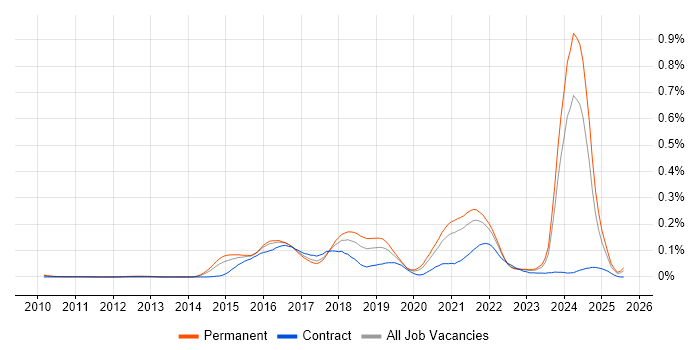IBM Cloud Computing
England > South East
The table below provides summary statistics and salary benchmarking for jobs advertised in the South East requiring IBM Cloud skills. It covers permanent job vacancies from the 6 months leading up to 15 January 2026, with comparisons to the same periods in the previous two years.
| 6 months to 15 Jan 2026 |
Same period 2025 | Same period 2024 | |
|---|---|---|---|
| Rank | 266 | 259 | 279 |
| Rank change year-on-year | -7 | +20 | - |
| Permanent jobs citing IBM Cloud | 1 | 35 | 12 |
| As % of all permanent jobs in the South East | 0.010% | 0.39% | 0.14% |
| As % of the Cloud Services category | 0.031% | 1.18% | 0.42% |
| Number of salaries quoted | 1 | 0 | 5 |
| 10th Percentile | - | - | - |
| 25th Percentile | - | - | £51,500 |
| Median annual salary (50th Percentile) | £35,000 | - | £53,000 |
| 75th Percentile | - | - | £57,500 |
| 90th Percentile | - | - | £59,000 |
| England median annual salary | £75,000 | £55,000 | £70,000 |
| % change year-on-year | +36.36% | -21.43% | +0.80% |
All Cloud Computing Skills
South East
IBM Cloud falls under the Cloud Services category. For comparison with the information above, the following table provides summary statistics for all permanent job vacancies requiring cloud computing skills in the South East.
| Permanent vacancies with a requirement for cloud computing skills | 3,178 | 2,960 | 2,843 |
| As % of all permanent jobs advertised in the South East | 30.52% | 32.95% | 32.31% |
| Number of salaries quoted | 1,738 | 1,609 | 2,362 |
| 10th Percentile | £28,250 | £32,750 | £29,750 |
| 25th Percentile | £35,000 | £45,000 | £40,000 |
| Median annual salary (50th Percentile) | £50,000 | £60,000 | £52,500 |
| Median % change year-on-year | -16.67% | +14.29% | -8.70% |
| 75th Percentile | £69,960 | £75,000 | £67,500 |
| 90th Percentile | £87,500 | £86,250 | £80,000 |
| England median annual salary | £60,000 | £65,000 | £60,000 |
| % change year-on-year | -7.69% | +8.33% | -7.69% |
IBM Cloud
Job Vacancy Trend in the South East
Historical trend showing the proportion of permanent IT job postings citing IBM Cloud relative to all permanent IT jobs advertised in the South East.

IBM Cloud
Salary Trend in the South East
Salary distribution trend for jobs in the South East citing IBM Cloud.

IBM Cloud
Job Locations in the South East
The table below looks at the demand and provides a guide to the median salaries quoted in IT jobs citing IBM Cloud within the South East region over the 6 months to 15 January 2026. The 'Rank Change' column provides an indication of the change in demand within each location based on the same 6 month period last year.
| Location | Rank Change on Same Period Last Year |
Matching Permanent IT Job Ads |
Median Salary Past 6 Months |
Median Salary % Change on Same Period Last Year |
Live Jobs |
|---|---|---|---|---|---|
| Buckinghamshire | - | 1 | £35,000 | - | |
| Thames Valley | - | 1 | £35,000 | - | |
| IBM Cloud England |
|||||
IBM Cloud
Co-Occurring Skills & Capabilities in the South East by Category
The following tables expand on the one above by listing co-occurrences grouped by category. They cover the same employment type, locality and period, with up to 20 co-occurrences shown in each category:
|
|
|||||||||||||||||||||
|
|
|||||||||||||||||||||
|
|
|||||||||||||||||||||
|
|
|||||||||||||||||||||
|
||||||||||||||||||||||
